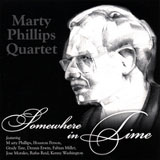Home » Jazz Articles » Album Review » Marty Phillips Quartet: Somewhere in Time
Marty Phillips Quartet: Somewhere in Time
Subsequent investigation reveals a 50-something singer/pianist with an extensive music career, who was born, raised and educated with a B.A. in music in the New York City area. A serious pianist, additionally tutored by lessons with masters like Sir Roland Hanna, Cedar Walton and Joanne Brackeen, he's played virtually all the well-known past Big Apple jazz spots, and top flight venues in other cities. This included heading a trio as the house band for the Blue Note in 1981-82. He's also led quartets featuring stellar instrumentalists such as Frank Wess, Al Cohn, Ted Curson and Jerry Dodgion, and Carmen McRae employed him as pianist, as did one of his key vocal influences—Johnny Hartman, for two years of road engagements.
His debut the quartet LP, Sweet Tomorrows (Audiophile, 1988), featured Jerry Dodgion on alto saxophone in addition to Phillips' piano, vocals, five compositions and arrangements. It received a positive reaction from talented instrumentalists and vocalists. However, his subsequent career has focused on performing, producing and teaching.
The most striking characteristic about Somewhere in Time is a very polished, but unpretentious vocal timbre, which is densely rich and resonant, without being overly dark. The professionally clear enunciation, with sensitive, assured and refreshingly relaxed phrasing also stands out. The ballads, including Tadd Dameron's "If You Could See Me Now (with a beautifully read verse), Billy Eckstine's "I Wanna Talk About You and his own intelligently written title track are all sung and played with an aching intensity.
Jobim's "Dindi reflects his affinity for that special happy/sad quality infusing so much Brazilian music. Another highlight is Phillips' strong but gentle reading Rodgers and Hart's gorgeous "It Never Entered My Mind, a personal favorite since Johnny Hartman's version on The Voice That Is (Impulse!, 1964). Both treatments represent prime examples of the unique poignancy of a powerful, but touchingly vulnerable, masculine voice.
Bobby Timmons' "Moanin' reveals Phillips' most fervent side with spirited, but controlled, scatting and a dynamic, open-voiced ending. The quartet lays down a swinging medium-tempo version of Matt Dennis' seldom heard but exquisite "Love Turns Winter to Spring, with Phillips' flexible range and sustained breath control notably on display. Houston Person's seamlessly warm tenor sax solos and obbligatos provide an ideally suited accompanying voice throughout.
One can only imagine how popular a flawlessly tasteful and credible crooner-pianist like Phillips, with his dynamic, yet refined jazz sensibility, would have been in the 1940-1950s, when the public's appetite was informed by a more discerning ability to appreciate musical quality.
Track Listing
It Could Happen to You; If You Could See Me Now; I Wanna Talk About You; Dindi; Moanin'; If I Should Lose You; Beautiful Friendship; Somewhere in Time; Love Turns Winter Into Spring; It Never Entered My Mind; Time After Time.
Personnel
Marty Phillips: vocals, piano and synthesizers; Houston Person: tenor saxophone; Dennis Irwin: bass; Grady Tate: drums; Fabian Millet: congas (4); Jose Morales, latin percussion (4); Rufus Reid: bass (6); Kenny Washington: drums (6).
Album information
Title: Somewhere in Time | Year Released: 2007 | Record Label: Self Produced
< Previous
Europa
Comments
Tags
For the Love of Jazz
 All About Jazz has been a pillar of jazz since 1995, championing it as an art form and, more importantly, supporting the musicians who create it. Our enduring commitment has made "AAJ" one of the most culturally important websites of its kind, read by hundreds of thousands of fans, musicians and industry figures every month.
All About Jazz has been a pillar of jazz since 1995, championing it as an art form and, more importantly, supporting the musicians who create it. Our enduring commitment has made "AAJ" one of the most culturally important websites of its kind, read by hundreds of thousands of fans, musicians and industry figures every month.


















